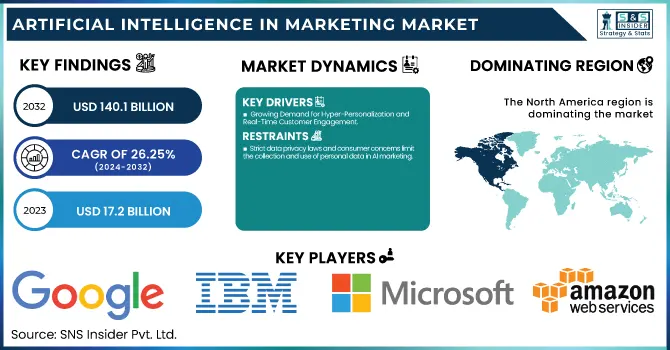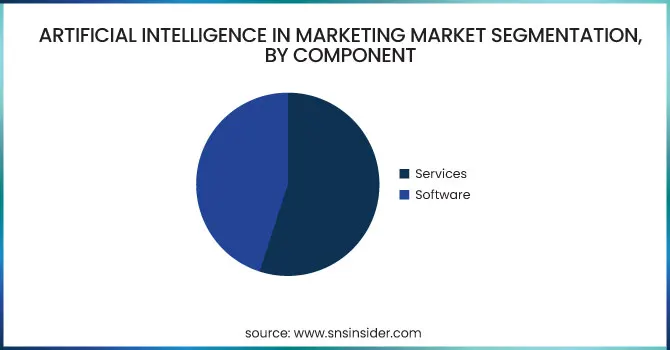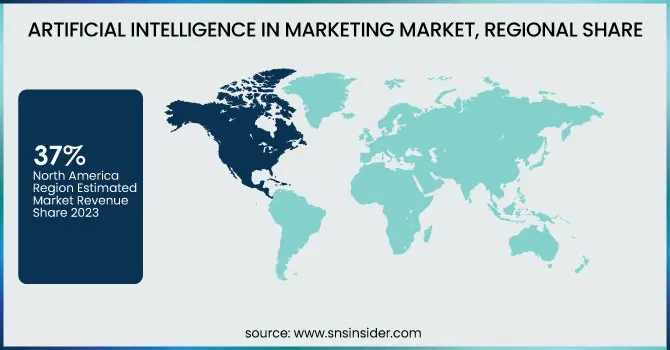Artificial Intelligence In Marketing Market Report Scope & Overview:
The Artificial Intelligence In Marketing Market was valued at USD 17.2 billion in 2023 and is expected to reach USD 140.1 billion by 2032, growing at a CAGR of 26.25% from 2024-2032.

To Get more information on Artificial Intelligence In Marketing Market - Request Free Sample Report
The Artificial Intelligence in Marketing Market is witnessing rapid expansion, with the adoption rate of AI tools rising steadily across industries such as retail, BFSI, healthcare, and e-commerce. Regional spending on AI-driven marketing solutions, particularly in North America, Europe, and Asia-Pacific, has grown significantly, driven by the demand for intelligent automation and customer personalization. Conversion rates have improved notably post-AI implementation as businesses leverage predictive analytics, AI content generation, and dynamic ad targeting. Furthermore, customer engagement metrics across channels like email, websites, and social media show marked enhancement due to AI-powered personalization strategies. In addition, the market is seeing a growing shift toward cloud-based deployment models, increasing use of generative AI for content creation, and a rising share of marketing budgets allocated to AI technologies. The return on investment from AI tools, especially among SMEs and large enterprises, further underscores the value AI brings to modern marketing strategies.
the U.S. Artificial Intelligence In Marketing Market was valued at USD 4.7 billion in 2023 and is expected to reach USD 37.5 billion by 2032, growing at a CAGR of 25.96% from 2024-2032. driven by rising demand for hyper-personalization, increased digital ad spending, and widespread adoption of generative AI tools. Supportive tech infrastructure and a mature digital ecosystem further accelerate deployment. The market is expected to grow at a robust CAGR through 2032, maintaining the U.S. as a global leader in AI-powered marketing solutions.
Artificial Intelligence In Marketing Market Dynamics
Driver
-
Growing Demand for Hyper-Personalization and Real-Time Customer Engagement
Personalized customer experience is one of the major factors contributing to AI adoption in marketing. With the wealth of data that any consumer can access, consumers today expect brands to provide them with personalized content, product recommendations, and real-time engagement. With AI, marketers can efficiently analyze massive datasets, accurately segment audiences, and automate personalized messaging across various platforms. From chatbots and recommendation engines to predictive analytics, AI tools greatly facilitate the ability to engage customers based on behavior, preferences, and context. The move toward data-driven, hyper-personalized marketing has enabled businesses to improve conversion rates, enhance customer loyalty, and drive ROI, cementing AI's role as a vital part of contemporary marketing practices.
Restraint
-
Strict data privacy laws and consumer concerns limit the collection and use of personal data in AI marketing.
While AI offers immense potential, data privacy and compliance remain significant restraints. AI in marketing heavily relies on collecting, analyzing, and leveraging personal data to drive insights and personalization. However, increasing concerns around consumer data misuse, along with stringent data protection regulations such as GDPR and CCPA, pose challenges for marketers. Organizations must ensure transparency, secure data handling, and ethical AI usage to maintain consumer trust. Non-compliance can result in heavy penalties and reputational damage. These concerns often slow down AI adoption, as businesses must invest in legal guidance, data governance frameworks, and privacy-preserving technologies to mitigate risks.
-
Generative and conversational AI tools offer scalable content creation and real-time customer interaction opportunities.
The integration of generative AI and conversational AI presents a transformative opportunity in marketing. Tools like ChatGPT, Bard, and custom AI models are revolutionizing how content is created and how brands interact with customers. Marketers can now generate high-quality ad copy, product descriptions, social media posts, and emails at scale, significantly reducing content production time and cost. Meanwhile, AI-powered chatbots and voice assistants enhance customer support, lead nurturing, and engagement across platforms. These innovations not only improve efficiency but also deliver more consistent and personalized brand experiences. As generative AI becomes more advanced, its role in shaping marketing strategies will expand rapidly.
Challenge
-
Implementing AI tools is hindered by technical integration issues and a lack of skilled marketing AI professionals.
Despite its benefits, AI integration into existing marketing ecosystems can be complex. Many organizations face challenges in merging AI tools with legacy CRM systems, content platforms, and analytics dashboards. This often results in fragmented workflows or underutilized AI capabilities. Additionally, there is a significant talent gap—many marketing teams lack the data science expertise required to effectively implement, manage, and optimize AI solutions. Upskilling existing staff or hiring AI specialists adds to operational costs. Overcoming these challenges requires strategic investment in training, partnerships with AI vendors, and the adoption of user-friendly AI platforms that align with marketers’ needs and technical capacities.
Artificial Intelligence In Marketing Market Segmentation Analysis
By Component
In 2023, the services segment dominated the market and accounted for 55% of the revenue share. For marketing as an application domain, the service segment includes the application of AI in improving customer service and customer support. AI enhances customer service tools, assisting firms in providing dedicated service experiences. Using the gathered data, AI algorithms are able to analyze customer data, such as purchase history and browsing behavior, to offer personalized recommendations and solutions to customers, leading to increased customer satisfaction.
The software segment is expected to register the fastest CAGR over the forecast period. Artificial intelligence technology is the basis of AI marketing software, which makes automated decisions using specific data. Additionally, the decisions are derived from data collected, analyzed, and interpreted based on market trends. As an example, Seventh Sense, a sales and marketing software platform based in Virginia, offers AI software to help condition email marketing campaigns and programs for higher performance and interaction.

By Application
The content curation segment dominated the market and held the largest revenue share in 2024. More advanced AI machine learning algorithms analyze user behavior and preferences, ultimately granting personalized content. Marketers use this approach to enhance the communication of their products, consequently increasing the need for artificial intelligence in marketing. In addition, AI is producing written material, from blog posts to social media updates.
The Virtual assistants segment registered significant CAGR in the forecast period. Chatbots, digital avatars, or voice assistants like Siri can understand and respond to user requests using natural language processing, computer vision, and machine learning algorithms. The market is mainly driven by the segment growth of customer service, healthcare, finance, and education as virtual assistance enhances human-computer interaction capabilities, thus making humanity more efficient and effective.
By Technology
The ML segment dominated the market and accounted for 42% of the revenue share in 2023. It enables computers to perceive, comprehend, and generate human language and assists computers in performing machine translation, sentiment analysis, question answering, and text generation. For example, these technologies are widely implemented in applications such as virtual assistants, chatbots, and personalized recommendation systems.
The computer vision segment is projected to grow at the fastest CAGR during the forecast period. The social media aspect can be customized by computer vision solutions. It can supply marketers with up-to-the-minute insights directly connected to consumer behavior. By way of illustration, an American technological multinational that goes by the name of Meta Platforms, Inc. uses a method called DINO to train vision transformers, which is usually used in AI for taking inputs like image data and processing it through neural layers. Additionally, it can identify and classify objects in a video without human intervention.
By End-Use
The media and entertainment segment dominated the AI in marketing market in 2023 and accounted for a significant revenue share due to its high demand for personalized content delivery, audience behavior analysis, and automated media planning. Streaming platforms, gaming companies, and content creators use AI for real-time recommendations, dynamic ad placements, and sentiment analysis. With increasing content consumption and digital advertising, this segment will continue to lead in innovation and adoption. The market is expected to witness steady growth through 2032, driven by advanced AI integration in content curation and consumer engagement strategies.
The IT and telecommunications sector is projected to grow at a notable CAGR from 2024 to 2032, fueled by the adoption of AI in customer support automation, churn prediction, and network-based marketing optimization. AI helps telecom providers personalize service offers, analyze customer interactions, and reduce operational costs. Additionally, the shift to 5G and cloud-native infrastructures supports real-time AI deployment. As these firms embrace AI-powered analytics and campaign automation tools, the segment is expected to become a major contributor to the AI marketing market’s expansion over the coming years.
Regional Landscape
North American artificial intelligence in marketing dominated the market in 2023 and accounted for 37% of revenue share, contributing the highest revenue share in the year 2024. The reason for the region's growth is the expansion of retail, BFSI, healthcare, automotive, and other industries. Well-established tech companies in the region all know the promising opportunities offered by AI in Marketing. Notably, in the region, domestic small and large companies are significantly employing AI as compared to the rest of the world.
The Asia Pacific artificial intelligence in marketing market will exhibit the fastest CAGR. The Asia-Pacific region witnesses a seismic shift in military capacities through artificial intelligence—by the likes of China, however the heavens help, Japan and India. China's investments focus on military applications, with potential upgrades to its People's Liberation Army capabilities in areas like algorithmic warfare and autonomous systems, which would reshape the regional power balance and challenge U.S. influence.

Get Customized Report as per Your Business Requirement - Enquiry Now
Key Players
The major key players along with their products are
-
Google LLC – Google Ads
-
IBM Corporation – Watson Marketing
-
Microsoft Corporation – Dynamics 365 Marketing
-
Amazon Web Services (AWS) – Amazon Personalize
-
Adobe Inc. – Adobe Sensei
-
Oracle Corporation – Oracle Eloqua
-
Salesforce Inc. – Salesforce Marketing Cloud
-
Meta Platforms, Inc. – Meta Advantage+
-
SAP SE – SAP Emarsys Customer Engagement
-
HubSpot, Inc. – HubSpot Marketing Hub
-
H2O.ai – H2O Driverless AI
-
CognitiveScale Inc. – Cortex AI
-
Persado Inc. – Persado Motivation AI
-
Mailchimp (Intuit Inc.) – Mailchimp Smart Recommendations
-
Drift.com, Inc. – Drift Conversational Marketing Platform
Recent Developments
-
In May 2024, Alphabet, Google's parent company, considered acquiring HubSpot to enhance its cloud-based applications and CRM capabilities, aiming to challenge Microsoft's dominance in the sector.
-
In October 2024, IBM expanded its AI initiatives by strengthening partnerships with major tech companies, including Microsoft, Amazon, and Meta. The company enhanced its Watsonx platform by integrating third-party models like Meta's Llama 3 and Microsoft's Mistral and collaborated with AWS on AI governance.
-
In October 2024, Microsoft, in collaboration with Infosys, expanded efforts to accelerate customer adoption of generative AI and Microsoft Azure globally. This strategic partnership aims to help joint customers realize the value of their technology investments and secure transformative outcomes.
-
In October 2024, AWS expanded its AI offerings by making Grammarly's AI-powered writing assistant available in the AWS Marketplace, allowing businesses to enhance productivity and communication.
|
Report Attributes |
Details |
|
Market Size in 2023 |
US$ 17.2 Billion |
|
Market Size by 2032 |
US$ 140.1 Billion |
|
CAGR |
CAGR of 26.25 % From 2024 to 2032 |
|
Base Year |
2023 |
|
Forecast Period |
2024-2032 |
|
Historical Data |
2020-2022 |
|
Report Scope & Coverage |
Market Size, Segments Analysis, Competitive Landscape, Regional Analysis, DROC & SWOT Analysis, Forecast Outlook |
|
Key Segments |
• By Component (Software, Services) |
|
Regional Analysis/Coverage |
North America (US, Canada, Mexico), Europe (Eastern Europe [Poland, Romania, Hungary, Turkey, Rest of Eastern Europe] Western Europe] Germany, France, UK, Italy, Spain, Netherlands, Switzerland, Austria, Rest of Western Europe]), Asia Pacific (China, India, Japan, South Korea, Vietnam, Singapore, Australia, Rest of Asia Pacific), Middle East & Africa (Middle East [UAE, Egypt, Saudi Arabia, Qatar, Rest of Middle East], Africa [Nigeria, South Africa, Rest of Africa], Latin America (Brazil, Argentina, Colombia, Rest of Latin America) |
|
Company Profiles |
Google LLC, IBM Corporation, Microsoft Corporation, Amazon Web Services (AWS), Adobe Inc., Oracle Corporation, Salesforce Inc., Meta Platforms, Inc., SAP SE, HubSpot, Inc., H2O.ai, CognitiveScale Inc., Persado Inc., Mailchimp (Intuit Inc.), Drift.com, Inc. |

